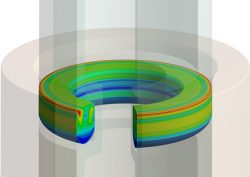Elastomer Testing & Analysis
Elastomer Testing & Analysis Prior To Assembly / After Failure
M Barnwell Services uses a specialist selection of independent Testing & Analysis consulting services when inspecting polymeric materials. Some key Elastomer Testing abilities include:
- Failure analysis
- Thermo-mechanical assessment
- Chemical compatibility
- Microscopy
- Explosive Decompression / Rapid Gas Decompression (RGD)
The development consists of a broad scope of machinery committed to the expansion of production techniques for new and unconventional materials. It has a dedicated development press and uses a number of different post-cure systems (inert atmosphere and standards ovens). As new materials and plans are evolved, processing features are fully determined prior to full production starts.
M Barnwell Services offers a comprehensive consultancy service including recommendation and assistance in material choosing, sample testing, professional polymer chemists, seal design engineering and also troubleshooting on any sealing issue.
Chemical Compatibility
Seal materials are frequently used in specific mixtures of liquids over a broad range of temperatures. Test techniques provide chemical compatibility tests to be executed to tackle particular customer needs. Additionally, variations in physical characteristics for different materials can be investigated and determination of the best polymer material for the chemical media.
Failure Analysis
A seal that has failed in an installation is assessed using a number of methods to distinguish the source of problem and failure mode. This frequently includes distinguishing amongst chemical and thermal degradation and analyzing different potential causes, which could include early ageing, poor design, mechanical failure, contaminants and environmental stress. Furthermore, we offer support in suggesting different materials of designs.
Thermo-mechanical Evaluation
Using environmental chambers to analyze physical features of materials at actual or raised operating temperatures enables precise outcomes. They are very much alike real installations. The data is then used in Finite Element Analysis (FEA) computer simulation to produce precise simulations of seal design.
Thermal analysis
Differential Scanning Calorimetry (DSC)
DSC testing relies upon a comparison of the endothermic and exothermic responses of samples and a reference, as the sample and reference are heated through a determined heating scheme. The method, therefore, provides precise resolution of glass conversion temperatures, crystallization and melting points, and in the case of rubbers, cure features. Therefore this method is important for failure examination, establishing the low-temperature execution of a sealing material and element development.
Thermogravimetric Analysis (TGA)
TGA testing relies upon the precise weighing of a sample as it is heated. Generally, the temperatures are between -25°C and +800°C. Furthermore, as the heating advances, various components of the rubber composition ‘burn off’ consequently decreasing the weight. A step-like structure appears which associates quantitatively with the components of the composition. Therefore, this method is beneficial for compound development, process control, failure analysis and reverse-engineering.
Infra-red Spectroscopy (FTIR)
FTIR consists of passing an infra-red light through or impinging on a sample of material. The light loses some of its energy, generating different molecular forms in the sample to stretch, twist or vibrate. In addition, the resultant light is then equated with a reference light stream and the outcome presented as a feature plot of summits. Therefore, this method is valuable in ‘fingerprint’ materials, compound development and failure analysis.
Explosive Decompression ED Testing
Explosive Decompression (ED) damage of elastomer seals appears when seals are under high stress for a certain amount of time and then suddenly de-pressurized. Gases absorbed into the rubber quickly broaden causing the seal to split/break.
ED testing machinery can compress seals of different geometries up to 20,000PSI (13.8MPa) and can de-pressurize over any requested time or cycle, whilst at a temperature of up to 250°C. Using these tools, compounds can be developed and examined to conquer this environment, with stress, temperature and stress release cycles simulating real sphere operation. This, therefore, assures the performance of seal varieties and grades prior to assembly.
If you require additional information about our range of services including Elastomer Testing, download our catalogue or contact a member of the team.
E & OE. Data provided by manufacturing supply partners.
